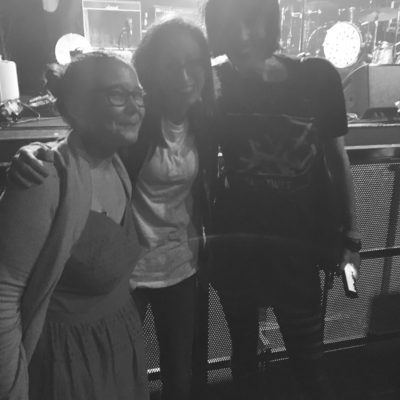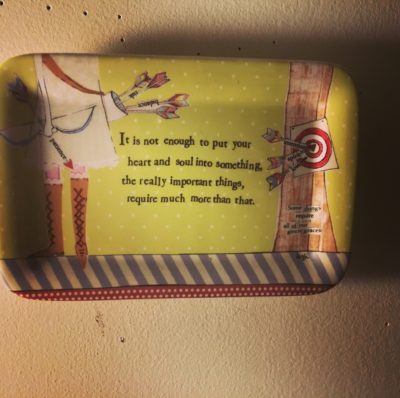Ruthless
I was discharged from the hospital last night. I was admitted on Monday after going to the ER. I wasn’t having anaphylaxis. I wasn’t sure exactly what was wrong. But I felt disgusting. I had a pounding headache and bad bone pain in both legs and my pelvic bones. I was exhausted. I was so tachycardic that it made me short of breath. My blood pressure was all over the place. I was miserable. Nothing I did was helping. So I went in.
I am adrenally insufficient. I have been for years, since daily high dose prednisone in 2013/2014. My body doesn’t make cortisol so I have to take daily steroids to compensate. When my body is under physical stress, I have to take more steroids to cover the additional need for stress hormones. If I don’t, it can cause a life threatening situation called an Addisonian crisis. I had a crisis in May 2014 that lasted several days. Since then, I am very careful to monitor my body for signs of low cortisol.
In case it’s not obvious where I’m going with this, I was having an Addisonian crisis. My cortisol level was almost undetectable. It didn’t feel like it has in the past and I have no idea what triggered it. I took some extra steroids and stayed a while to see how much it helped. I sat in my hospital bed all night, headphones in, doing work. Work is rapidly becoming the only thing in my life I can control.
I take a lot of medications. I take handfuls of pills every day. I use IV meds and IV fluids every day. I get weekly and monthly injections. The schedule I have to keep in order to accommodate taking all those meds is insane. I basically take medication every thirty minutes while I’m awake. I have to carefully time my meals and anything I drink. I can only exercise at specific times. I can only shower 1-2 hours after night time meds. I have to be very careful with things like public transportation and going to a crowded place in case I get stuck somewhere.
I professionally develop diagnostics to determine which patients will benefit best from clinical trial therapies. It is easier to develop diagnostics than to manage my health from day to day.
People often ask how I am able to travel and work full time. IV Benadryl is not the entire reason I can do those things but it is a huge part of it. I have been using IV Benadryl at home for almost four years. It has kept me out of the hospital on many occasions. It has prevented many reactions from turning into anaphylaxis. It gives me much more control in emergency situations and has kept me safe in many situations that could otherwise have been catastrophic.
Despite how much this drug has helped me, I literally get anxiety thinking about how much IV Benadryl has helped me. The reason for this is that it is a nightmare getting ahold of it. It is not expensive and it is not a controlled substance. Still, getting this is a weekly stressor. I get all my IV meds, infusions, and line care/nursing through a home infusion company. Despite the fact that they provide me with a supply of everything else I need several days before I need them, they will not do this with Benadryl. My doctor has asked. I have asked. My nursing team has asked. I have asked all the people who can be asked. The pharmacy will not do it. Instead, they insist that they deliver me meds on the day that I will be out of them, meaning that if that order does not arrive as expected, I could be out of medication.
I have been a patient there for four years. My nursing care and line care has been amazing. That’s why I have stayed there. I have had a continuously used central line for all that time. I have never had an infection. The reason I have never had an infection is because I adhere to really extraordinary guidelines pertaining to contamination. If I think there is a tiny chance that something is contaminated, I just throw it away and start over. If a needle slips, or I drop something, or accidentally touch a surface with the syringe, I throw it away. This means that I throw away a vial of Benadryl every few days. I have asked the pharmacy to provide me with a few extra days of meds every few months to cover for this situation. They won’t.
The worst part of this whole situation is that my meticulousness, which is regularly commended by my providers, means that I am already working with less medication than I should be. Compounded with this pharmacy’s actions, I have been left without medication on several occasions.
Someone new at this pharmacy recently decided that they would send me my meds a day early. This seemed like a great plan. I was totally onboard. But I was still nervous that it would get messed up. It also didn’t allow for short term changes or short notice deliveries. Earlier this week, when I was in the ER before being admitted, I had to use my own meds for more frequent dosing because they weren’t getting my meds on time. (This was acknowledged and approved by the ER team – I would never do this unless they were aware and onboard.)
The bottom line is that my pharmacy delivery is going to be a day late again after being assured again today that it would arrive today. Because I had to discard two vials over this past weekend for possible contamination and I needed to use extra on Monday (as directed), I am now out of this med. Again.
I had a legit breakdown tonight when I realized that I was going to be out of this med again. Screaming, hysterically crying, the whole thing. This has been such a struggle for so long over something that is really, really stupid to argue about. No one argues that I don’t need the med. I don’t take more than I am directed, ever. No one argues that I should discard anything that might be contaminated and start over. But no one in any position to authorize something as silly as giving me three or four extra vials a week will do so. So I will be up all night hoping I don’t end up having anaphylaxis and going to the hospital if I have serious symptoms that could potentially become anaphylaxis even if they didn’t start that way.
I am very, very tired of this life. I have lots of good days. But as time as gone on, the bad days have gotten much worse. There is no aspect of living with chronic, life threatening health problems that is not stress. I really want to just rip this port out and stop taking IV meds and stop working and stop fighting every single day. I just want to rest. I want it to be quiet. I don’t want to have to explain myself over and over and beg people who just don’t care to help me.
There is a ruthless truth to chronic illness, one that has taken me years to come to terms with. It is this: that fighting against my illness and the life it gave me is not a successful way to improve it. I cannot overcome this disease. I can only cooperate with it. I have to learn to live with it, have a relationship with it, greet it every morning and say goodnight when I close my eyes at night. It is a part of me that cannot be cut out or ignored. And to have a life with it, a good one, I have to want that life. I can’t fight for a life I don’t want. My insistence upon having a good life with this disease is not a choice. It is a survival mechanism. It an instinct.
I know that this will pass, but there are some days when I don’t want to do this.
I don’t want to fight anymore. I don’t want to be afraid.
And tonight, I don’t want this life.

